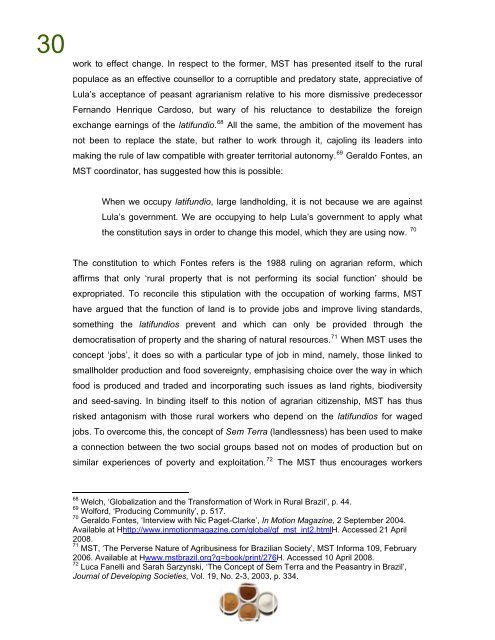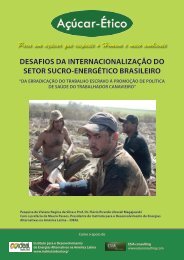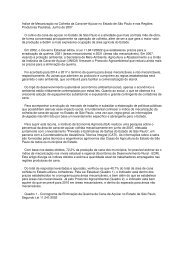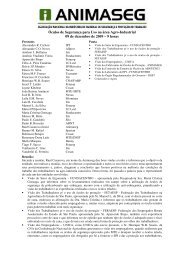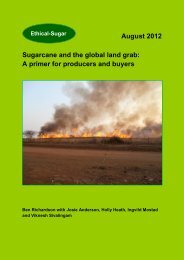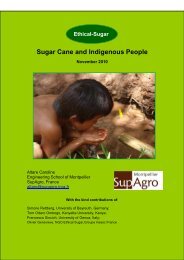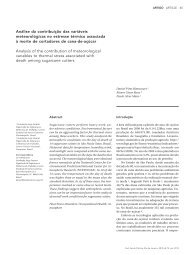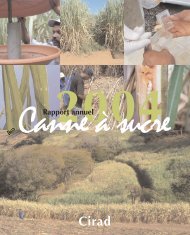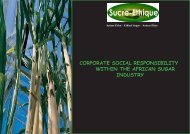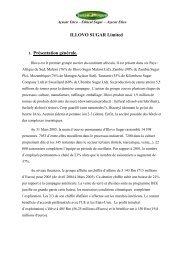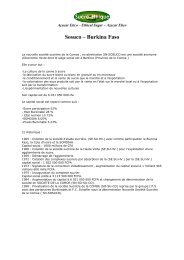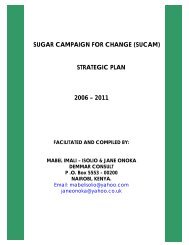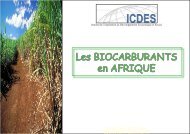The Development Model of Brazilian Sugarcane - Sucre Ethique
The Development Model of Brazilian Sugarcane - Sucre Ethique
The Development Model of Brazilian Sugarcane - Sucre Ethique
You also want an ePaper? Increase the reach of your titles
YUMPU automatically turns print PDFs into web optimized ePapers that Google loves.
30<br />
work to effect change. In respect to the former, MST has presented itself to the rural<br />
populace as an effective counsellor to a corruptible and predatory state, appreciative <strong>of</strong><br />
Lula’s acceptance <strong>of</strong> peasant agrarianism relative to his more dismissive predecessor<br />
Fernando Henrique Cardoso, but wary <strong>of</strong> his reluctance to destabilize the foreign<br />
exchange earnings <strong>of</strong> the latifundio. 68 All the same, the ambition <strong>of</strong> the movement has<br />
not been to replace the state, but rather to work through it, cajoling its leaders into<br />
making the rule <strong>of</strong> law compatible with greater territorial autonomy. 69 Geraldo Fontes, an<br />
MST coordinator, has suggested how this is possible:<br />
When we occupy latifundio, large landholding, it is not because we are against<br />
Lula’s government. We are occupying to help Lula’s government to apply what<br />
the constitution says in order to change this model, which they are using now. 70<br />
<strong>The</strong> constitution to which Fontes refers is the 1988 ruling on agrarian reform, which<br />
affirms that only ‘rural property that is not performing its social function’ should be<br />
expropriated. To reconcile this stipulation with the occupation <strong>of</strong> working farms, MST<br />
have argued that the function <strong>of</strong> land is to provide jobs and improve living standards,<br />
something the latifundios prevent and which can only be provided through the<br />
democratisation <strong>of</strong> property and the sharing <strong>of</strong> natural resources. 71 When MST uses the<br />
concept ‘jobs’, it does so with a particular type <strong>of</strong> job in mind, namely, those linked to<br />
smallholder production and food sovereignty, emphasising choice over the way in which<br />
food is produced and traded and incorporating such issues as land rights, biodiversity<br />
and seed-saving. In binding itself to this notion <strong>of</strong> agrarian citizenship, MST has thus<br />
risked antagonism with those rural workers who depend on the latifundios for waged<br />
jobs. To overcome this, the concept <strong>of</strong> Sem Terra (landlessness) has been used to make<br />
a connection between the two social groups based not on modes <strong>of</strong> production but on<br />
similar experiences <strong>of</strong> poverty and exploitation. 72 <strong>The</strong> MST thus encourages workers<br />
68 Welch, ‘Globalization and the Transformation <strong>of</strong> Work in Rural Brazil’, p. 44.<br />
69 Wolford, ‘Producing Community’, p. 517.<br />
70 Geraldo Fontes, ‘Interview with Nic Paget-Clarke’, In Motion Magazine, 2 September 2004.<br />
Available at Hhttp://www.inmotionmagazine.com/global/gf_mst_int2.htmlH. Accessed 21 April<br />
2008.<br />
71 MST, ‘<strong>The</strong> Perverse Nature <strong>of</strong> Agribusiness for <strong>Brazilian</strong> Society’, MST Informa 109, February<br />
2006. Available at Hwww.mstbrazil.org?q=book/print/276H. Accessed 10 April 2008.<br />
72 Luca Fanelli and Sarah Sarzynski, ‘<strong>The</strong> Concept <strong>of</strong> Sem Terra and the Peasantry in Brazil’,<br />
Journal <strong>of</strong> Developing Societies, Vol. 19, No. 2-3, 2003, p. 334.<br />
Ethicl


